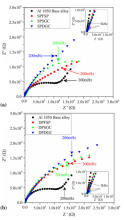Electrochemical Behavior of Aluminum-Molybdenum Surface Composites Developed by Friction Stir Processing
| Abstract | Aluminum alloys find application in aerospace, automobile, and structural sectors. However, these alloys are susceptible to corrosion attack in chloride environments. Introducing a second species on the surface by surface composite fabrication can be a way to increase the corrosion resistance of the aluminum alloys. Here, we present corrosion studies on aluminum matrix surface composites fabricated using friction stir processing. The reinforcement of Mo particles is considered with varying percentage and distribution in the surface composite. The particle content and distribution are analyzed using SEM–EDS and optical image analysis. Based on the potentiodynamic polarization analysis, the surface composites exhibit improved corrosion resistance with higher corrosion potential and lower corrosion rate. Increase in corrosion resistance is observed for higher Mo content with homogenous distribution. While the base alloy exhibit mixed corrosion behavior, the surface composites show charge-transfer controlled corrosion behavior in the Electrochemical Impedance Spectroscopy. Reduced pitting in the Mo-rich areas is confirmed by microscopic analysis of the corroded material. |
| Faculty |
Dr. Mahesh V. P.
|
|
maheshvp@pec.edu.in
|
|
| Collaborations | Indian Institute of Technology (IIT) Gandhinagar, Gujarat&Institute for Plasma Research (IPR), Gandhinagar, Gujarat |
| More Information |







